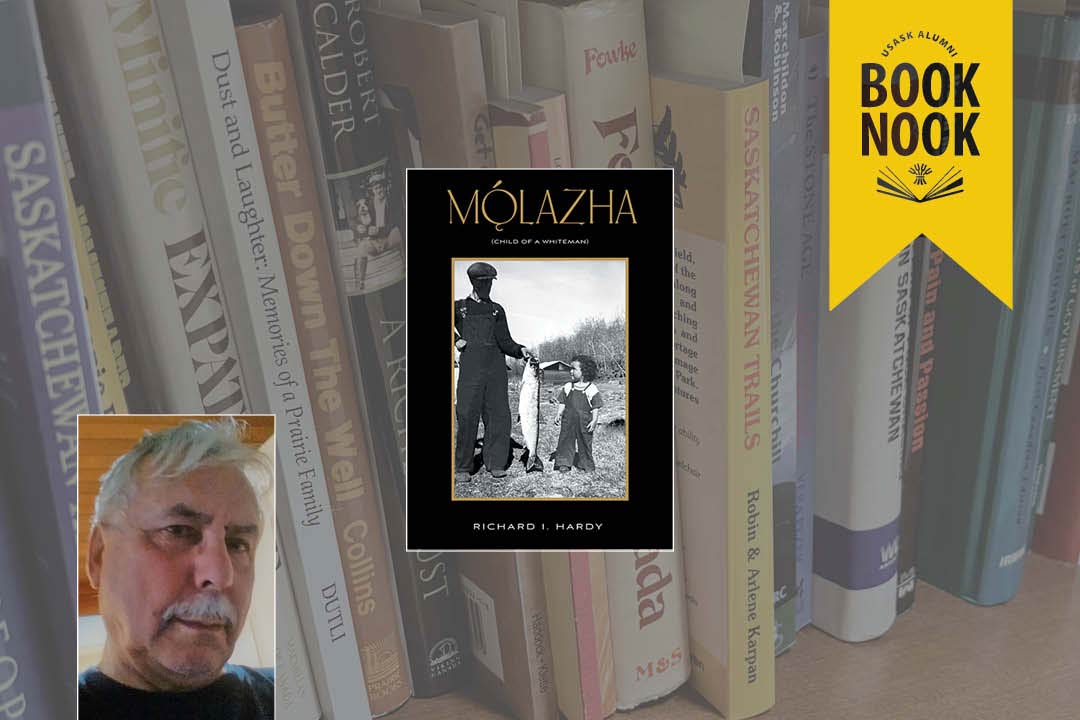
Alumni Book Nook: Richard I. Hardy (LLB’81)
Retired lawyer Rick Hardy tells a story of survival and resilience in his memoir, Mǫ́lazha (Child of a Whiteman)
University of Saskatchewan (USask) graduate Richard I. Hardy (LLB’81)—often called Rick— is a retired lawyer who practiced law for more than 35 years. Hardy has dedicated his life to advancing the rights of the Métis of the Northwest Territories, particularly those from the Mackenzie River District, and on Oct. 17, 2024, he was invested as a Member of the Order of the Northwest Territories. Hardy, a former president of the Fort Norman Métis Community, was previously honoured with the Confederation of Canada Award and the Queen Elizabeth II Diamond Jubilee Medal.
Hardy was born and raised in the Northwest Territories and studied at USask’s College of Law, where he earned a Bachelor of Laws degree in 1981. In his retirement, he was inspired to write his first book, Mǫ́lazha (Child of a Whiteman), through which he aims to educate readers about the Mackenzie River Métis and the history of the Métis people. Hardy’s book also focuses on his experiences at residential schools and the impacts those experiences had on his life.
Hardy self-published his memoir through Friesen Press. As the Friesen Press website notes, “By illuminating life in the North, what it means to be Métis, the role of nature and nurture in raising a child, and his lived experiences at residential schools, Rick aims to increase awareness of the trauma that occurred at residential schools and foster acceptance and understanding of the truth.”
Hardy, who has three children and six grandchildren, now lives on Vancouver Island, B.C., with his wife, Maryann, and their pets. The Green&White asked Hardy what inspired him to write the memoir and how it felt to publish his first book.
What inspired you to write this book and share your story?
The book has two main components. First, there is my family story and how we evolved into being Métis. There are many people in the N.W.T. who were, at one time, considered to be Métis but have since taken on Indian status. I wanted to examine my family’s experience with this issue and explain how we still consider ourselves to be Métis. The second main component is the issue of residential schools in the N.W.T. When the truth began gaining traction in the N.W.T., and elsewhere, there was a lot of denial. I felt that because of my standing in society I should stand up and say what happened to me to blunt the denialism. My standing in society stemmed, in large part, from the fact that I was a lawyer with a high-profile practice.
How did it feel to write and publish your first book?
It was a very emotional journey writing the book. Publication brought a great sense of relief.
What are five adjectives that you would use to describe your book?
Historical, explosive, truthful, sensitive, and fearsome.
What response have you received from readers?
What response I have received has been very supportive and congratulatory. That being said, the market for the book has been mostly in the N.W.T. and friends and family elsewhere.
What advice do you have for other people who are considering writing a memoir?
Good question. If you have no experience in the business, be warned that it is a distinct genre. If you are not known, you will have difficulty finding an agent and a publisher. I finally went the self-publishing route, which can be expensive. When you actually get to writing, have someone available that can check your writing, at a minimum. As a writer, it is very difficult to “see” all your mistakes.
Why would you recommend your book to USask alumni?
Share the truth about the experience of residential school through the eyes of a survivor, who happened to be a USask graduate.


